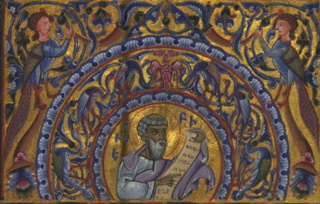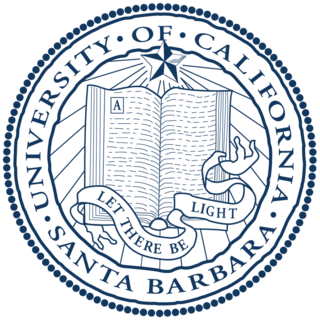Related Research Articles

Eusebius of Caesarea, also known as Eusebius Pamphilus, was a Greek Syro-Palestinian historian of Christianity, exegete, and Christian polemicist. In about AD 314 he became the bishop of Caesarea Maritima in the Roman province of Syria Palaestina. Together with Pamphilus, he was a scholar of the biblical canon and is regarded as one of the most learned Christians during late antiquity. He wrote Demonstrations of the Gospel, Preparations for the Gospel and On Discrepancies between the Gospels, studies of the biblical text. As "Father of Church History", he produced the Ecclesiastical History, On the Life of Pamphilus, the Chronicle and On the Martyrs. He also produced a biographical work on Constantine the Great, the first Christian Roman emperor, who was Augustus between AD 306 and AD 337.
Eusebius of Nicomedia was an Arian priest who baptized Constantine the Great on his deathbed in 337. A fifth-century legend evolved that Pope Sylvester I was the one to baptize Constantine, but this is dismissed by scholars as a forgery 'to amend the historical memory of the Arian baptism that the emperor received at the end of his life, and instead to attribute an unequivocally orthodox baptism to him.' He was a bishop of Berytus in Phoenicia. He was later made the bishop of Nicomedia, where the Imperial court resided. He lived finally in Constantinople from 338 up to his death.

The Phi Beta Kappa Society (ΦΒΚ) is the oldest academic honor society in the United States. It was founded at the College of William and Mary in Virginia in December 1776. Phi Beta Kappa aims to promote and advocate excellence in the liberal arts and sciences, and to induct outstanding students of arts and sciences at select American colleges and universities. Since its inception, its inducted members included later 17 United States presidents, 42 United States Supreme Court justices, and 136 Nobel laureates. Phi Beta Kappa (ΦΒΚ) stands for Φιλοσοφία Βίου Κυβερνήτης, which means "Wisdom [lit. love of knowledge] is the guide [lit. helmsman] of life".

Barbara K. Bodine is an American academic and former diplomat. Bodine formerly directed the Scholars in the Nation’s Service Initiative (SINSI) and lectured at Princeton's Woodrow Wilson School of Public and International Affairs. She currently serves as Distinguished Professor in the Practice of Diplomacy and Director of the Institute for the Study of Diplomacy at the School of Foreign Service of Georgetown University.

The University of California, Santa Barbara is a public land-grant research university in Santa Barbara County, California, United States. It is part of the University of California university system. Tracing its roots back to 1891 as an independent teachers' college, UCSB joined the ancestor of the California State University system in 1909 and then moved over to the University of California system in 1944. It is the third-oldest undergraduate campus in the system, after UC Berkeley and UCLA. Total student enrollment for 2022 was 23,460 undergraduate and 2,961 graduate students.
Christine Lehner is an American novelist and short story writer.
Sandra Annear Thompson is an American linguist specializing in discourse analysis, typology, and interactional linguistics. She is Professor Emerita of Linguistics at the University of California, Santa Barbara (UCSB). She has published numerous books, her research has appeared in many linguistics journals, and she serves on the editorial board of several prominent linguistics journals.

The Cheadle Center for Biodiversity and Ecological Restoration (CCBER) is a research center under the Office of Research at the University of California, Santa Barbara (UCSB) whose mission is to preserve regional biodiversity and restore ecosystems on campus lands. CCBER has three main functions: curation and preservation of natural history collections, native coastal ecosystem and habitat restoration on campus lands, and education and outreach for both UCSB students and local community schools.
Carol E. Genetti is an American linguist who is known for her research into Tibeto-Burman languages and languages of the Himalayans.
Betty K. Koed is an American historian who was the third Historian of the United States Senate and the first woman to hold that position. Upon her retirement, the US Senate designated her as Historian Emerita of the United States Senate.
Vale Leonard Broom also known as Leonard Bloom, was an American sociologist whose career spanned seven decades. He was known for his research on discrimination and social inequality, which began with his studies on the effects of Japanese internment.
William (Bill) Paxton is a computer scientist at the University of California, Santa Barbara. He is one of the founders of Adobe Systems and became one of the original designers and implementors of the PostScript page description language.
Shane W. Davis is an American astrophysicist. He is an assistant professor in the department of astronomy at the University of Virginia. Davis was a senior research associate at the Canadian Institute for Theoretical Astrophysics. He was awarded a Sloan Research Fellowship in 2015.
Julio Bortolazzo (1915-2006) was an American higher education administrator, and a pioneer in the development of community colleges in California.
The Discography of American Historical Recordings (DAHR) is a database catalog of master recordings made by American record companies during the 78rpm era. The 78rpm era was the time period in which any flat disc records were being played at a speed of 78 revolutions per minute. The DAHR provides some of these original recordings, free of charge, via audio streaming, along with access to the production catalogs of those same companies. DAHR is part of the American Discography Project (ADP), and is funded and operated in partnership by the University of California, Santa Barbara, the National Endowment for the Humanities, and the Packard Humanities Institute.
Harold Kirker was an American historian. Born in San Francisco, Kirker was a direct descendant of the mountain man James Kirker (1793–1852).
References
- ↑ See El Camino Yearbook (1959) available online at: http://www.e-yearbook.com/yearbooks/North_Hollywood_High_School_El_Camino_Yearbook/1959/Page_100.html
- ↑ See letter to the editor in the Los Angeles Times (August 23, 2017).
- ↑ See listing of editors-in-chief at http://dailytrojan.com/history/eics/
- ↑ See the Key Reporter: Phi Beta Kappa’s Publication for News and Alumni Relations, available online at: http://www.keyreporter.org/AlumniNews/MemberSpotlight/Details/1345.htm. See also, “Professors in the Spotlight,” Daily Nexus (August 28, 2002) available online at http://dailynexus.com/2002-08-28/professors-in-the-spotlight/
- ↑ See “Hal Drake Retirement” oral history by Frank J. Frost at: https://www.youtube.com/watch?v=PS5Yk3vdPKA
- ↑ See Historia: Newsletter of the UCSB History Associates (June, 1989) p. 5 available online at: https://www.history.ucsb.edu/wp-content/uploads/June-1989.pdf.
- ↑ See library catalog entry at the University of Wisconsin, Madison at: https://search.library.wisc.edu/catalog/999876135502121
- ↑ See library catalog entry at the University of Wisconsin, Madison at: https://search.library.wisc.edu/catalog/999794623402121
- ↑ See “Hal Drake Retirement” oral history by Frank J. Frost at: https://www.youtube.com/watch?v=PS5Yk3vdPKA
- ↑ See the Key Reporter: Phi Beta Kappa’s Publication for News and Alumni Relations, available online at: http://www.keyreporter.org/AlumniNews/MemberSpotlight/Details/1345.html
- ↑ See awards list at UCSB Academic Senate Website at: https://senate.ucsb.edu/awards/recipients/
- ↑ See list of award winners at the UCSB Alumni Association website at: https://www.ucsbalum.com/events/awards/past-recipients
- ↑ See awards list at UCSB Academic Senate Website at: https://senate.ucsb.edu/awards/recipients/
- ↑ See Historia: Newsletter of the UCSB History Associates (October, 1990) p. 5 available online at: https://www.history.ucsb.edu/wp-content/uploads/October-1990.pdf.
- ↑ See listing at Institute for Advanced Study website at: https://www.ias.edu/scholars/harold-allen-drake
- ↑ Historia: Newsletter of the UCSB History Associates (March, 1991), p. 5 available online at: https://www.history.ucsb.edu/wp-content/uploads/March-1991.pdf.
- ↑ See Fund description at: https://www.history.ucsb.edu/awards/harold-and-kathleen-drake-fund/
- ↑ See the Key Reporter: Phi Beta Kappa’s Publication for News and Alumni Relations, available online at: http://www.keyreporter.org/AlumniNews/MemberSpotlight/Details/1345.html
- ↑ See review by Andrew Marsham in Classical Review 62 (2012): 575-577.
- ↑ See publication information at the online Bloomsbury Publishing catalog at: https://www.bloomsbury.com/us/the-rhetoric-of-power-in-late-antiquity-9781350157941/